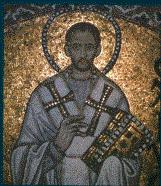John Chrysostom was born in Antioch in 349 A.D.. As a youth, he studied with the renowned scholar Libanius, who hoped that his bright student would enter the world of law. But John was a Christian, and after his baptism in 368, decided to use his talents in the realm of religion. At this point in the development of Christianity, it was not beneath the station of a young man from the privileged class, such as John, to pursue religion. Connections made through the Church could take one places, and the bishop of Antioch wielded a great amount of power. John immediately began his study of the scriptures under Bishop Meletius.
The monastic movement had become extremely popular, and John felt its pull. His friends encouraged him, but he hesitated because of his mother (his father had died when he was a child). The ascetic life of the monks was a difficult one, and she was afraid that John might never return. John wrote about his consideration of monasticism: "When I recently decided, having left the city, to go to the huts of the monks, I zealously inquired and investigated how one obtained the necessities of life, and whether one was able to eat fresh bread every day, whether someone would compel me to use the same oil from my lamp as for my food, whether someone would force on me the distressing fare of vegetables and drive me to severe work, such as being forced to dig the ground, carry wood, draw water and other similar tasks."
When his mother died, John fled to the desert and took up the ascetic life with the guidance of an old Syrian monk. He ate little, abstained from wine, slept on the bare ground, and prayed often. His poor dietary habits during this period supposedly disabled John's digestive system, making it difficult for him to eat solid food in later years. In 381, having returned to Antioch, John was ordained deacon. It was then that his skill as a public speaker became legendary. He gave vivid fiery sermons which were often directed against Christianity's Antiochene rivals, particularly the Aryans (who, though dying out, still exerted a presence) and the Jews (many Christians appartently both attended John's congregation and took part in activities at the synagogue). Years later, his oratory would earn him the nickname "Chrysostom", or, "golden-mouth".
In 397, John, without any personal involvement in the affair, was elected archbishop of Constantinople, making him one of the most powerful men in the East. His popularity continued, and he demonstrated special concern for the Goths under his jurisdiction. He had part of the Bible translated for them, and personally preached to them through an interpreter. However, his popular acclaim only aggravated jealous adversaries. In 401 he was banished after comparing the Empress to Jezebel. John died in exile in 407 in the city of Comene.
References
Wilken, Robert L. John Chrysostom and the Jews. (Los Angelos: University of California Press, 1983).
http://www.chrysostom.org - A solid site with an excellent image gallery.
